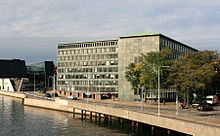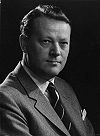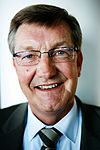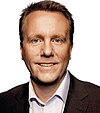
Denmark is a modern high-income and highly developed mixed economy, dominated by the service sector with 80% of all jobs; about 11% of employees work in manufacturing and 2% in agriculture. The nominal Gross National Income per capita was the ninth-highest in the world at $68,827 in 2023.
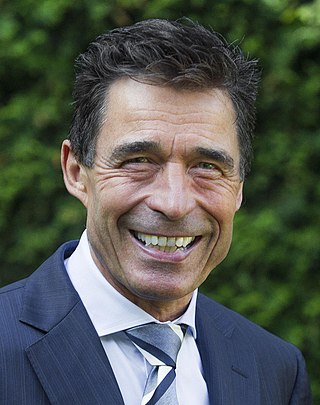
Anders Fogh Rasmussen is a Danish politician who was the 24th Prime Minister of Denmark from November 2001 to April 2009 and the 12th Secretary General of NATO from August 2009 to October 2014. He became founder of political consultancy Rasmussen Global and founded the Alliance of Democracies Foundation. He serves as a senior adviser to Citigroup. He also served as a senior advisor at the Boston Consulting Group.

Venstre, full name Venstre, Danmarks Liberale Parti, is a conservative-liberal, agrarian political party in Denmark. Founded as part of a peasants' movement against the landed aristocracy, today it espouses an economically liberal, pro-free-market ideology.
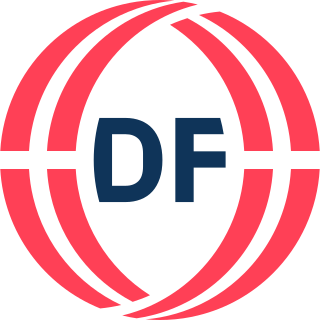
The Danish People's Party is a nationalist and right-wing populist political party in Denmark. It was formed in 1995 by former members of the Progress Party (FrP).

Claus Hjort Frederiksen is a Danish politician of the Venstre party, who served as the Danish Minister for Defence from 2016 to 2019, and as Minister for Finance from 2015 to 2016, having previously served in that position from 2009 to 2011, as member of the first Løkke Rasmussen Cabinet. From 2001 to 2009, he was Minister of Employment in the first, second, and third cabinets of Anders Fogh Rasmussen.

The Danish Ministry of Health is a Danish governmental ministry responsible for healthcare policy in Denmark. First created as an independent ministry in 1926, it has at various times been combined with the Ministry of the Interior as the Ministry of Interior and Health, most recently in 2022-, and has had various names. The current Minister for Health is Sophie Løhde, and the Permanent Secretary since 11 January 2021 is Svend Særkjær.
The Ministry of the Interior and Health is a former Danish ministry that has existed twice in the 21st century by combination of existing ministries.
Karen Moustgaard Jespersen is a Danish journalist and former politician representing the party Venstre.

General elections were held in Denmark on 15 September 2011 to elect the 179 members of the Folketing. Of those 179, 175 members were elected in Denmark, two in the Faroe Islands and two in Greenland.

Troels Lund Poulsen is a Danish politician, who is the Deputy Prime Minister of Denmark and leader of Venstre. He also serves as Minister of Defence. He previously served as Minister for the Environment from 2007 to 2010, Minister for Taxation from 2010 to 2011, Minister of Education in 2011, Minister for Commerce, Business and Growth from 2015 to 2016, Minister for Employment from 2016 to 2019, and Minister for Economic Affairs from 2022 to 2023. He has been a member of the Folketing since 2001, representing the Hedensted nomination district.
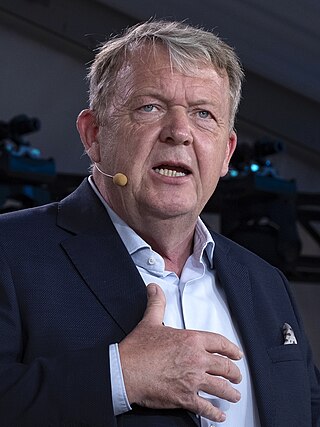
Lars Løkke Rasmussen is a Danish politician who has served as Minister of Foreign Affairs since 2022. He previously served as Prime Minister of Denmark from 2009 to 2011 and again from 2015 to 2019. He was Leader of the Venstre party from 2009 to 2019.

Karen Ellemann Kloch, formerly Karen Ellemann Karabian, is a Danish politician, who serves as the current Secretary General of the Nordic Council of Ministers. She was previously a member of the Folketing for the Venstre political party. She is a former minister, having held the positions of Minister of Fisheries, Equality and Nordic Cooperation, Minister of the Environment and Minister of the Interior and Social Affairs.

General elections were held in the Kingdom of Denmark on 5 June 2019 to elect all 179 members of the Folketing; 175 in Denmark proper, two in the Faroe Islands and two in Greenland. The elections took place ten days after the European Parliament elections.

The Second Cabinet of Lars Løkke Rasmussen was the Government of Denmark, in office between 28 June 2015 and 28 November 2016, when Lars Løkke Rasmussen third cabinet took over.
The Danish Chamber of Commerce is the network for the service industry in Denmark and one of the largest professional business organisations in the country. It was headquartered in Børsen in Copenhagen until the 2024 fire and has additional offices in Aarhus, Brussels and New York City.

The Minister for Public Utilities was originally a short lived, independent ministerial title, following a split from the Minister for Commerce, Industry, and Seafaring. It has since been revived by the Second cabinet of Lars Løkke Rasmussen.

Jakob Ellemann-Jensen is a Danish former politician who served as Deputy Prime Minister of Denmark and Minister of Defence under Prime Minister Mette Frederiksen from 2022 to 2023. He led the Venstre party from 2019 to 2023.

The Moderates is a liberal political party in Denmark founded by former Prime Minister and current Minister of Foreign Affairs Lars Løkke Rasmussen. He announced the name in a foundational speech on 5 June 2021. At the same time, he said that his main scenario was that the party would be formed after the 2021 Danish local elections. The name was, according to Rasmussen, inspired by the fictitious Prime Minister Birgitte Nyborg's party Moderaterne in the hit political TV drama Borgen as well as the Swedish Moderate Party, the then–second largest party in the Swedish Riksdag. The Moderates' political position is referred to as centre to centre-right.

Lars Aagaard Møller is a Danish politician with the Moderates. He has been serving as Minister for Climate, Energy and Utilities since December 2022.
Michael Starbæk Christensen is Danish diplomat and civil servant. He is the current Ambassador of Denmark to France, having previously served as Permanent Under Secretary of State for Foreign Affairs at the Prime Minister's Office (2015–2019), under Prime Minister Helle Thorning-Schmidt and Lars Løkke Rasmussen.

